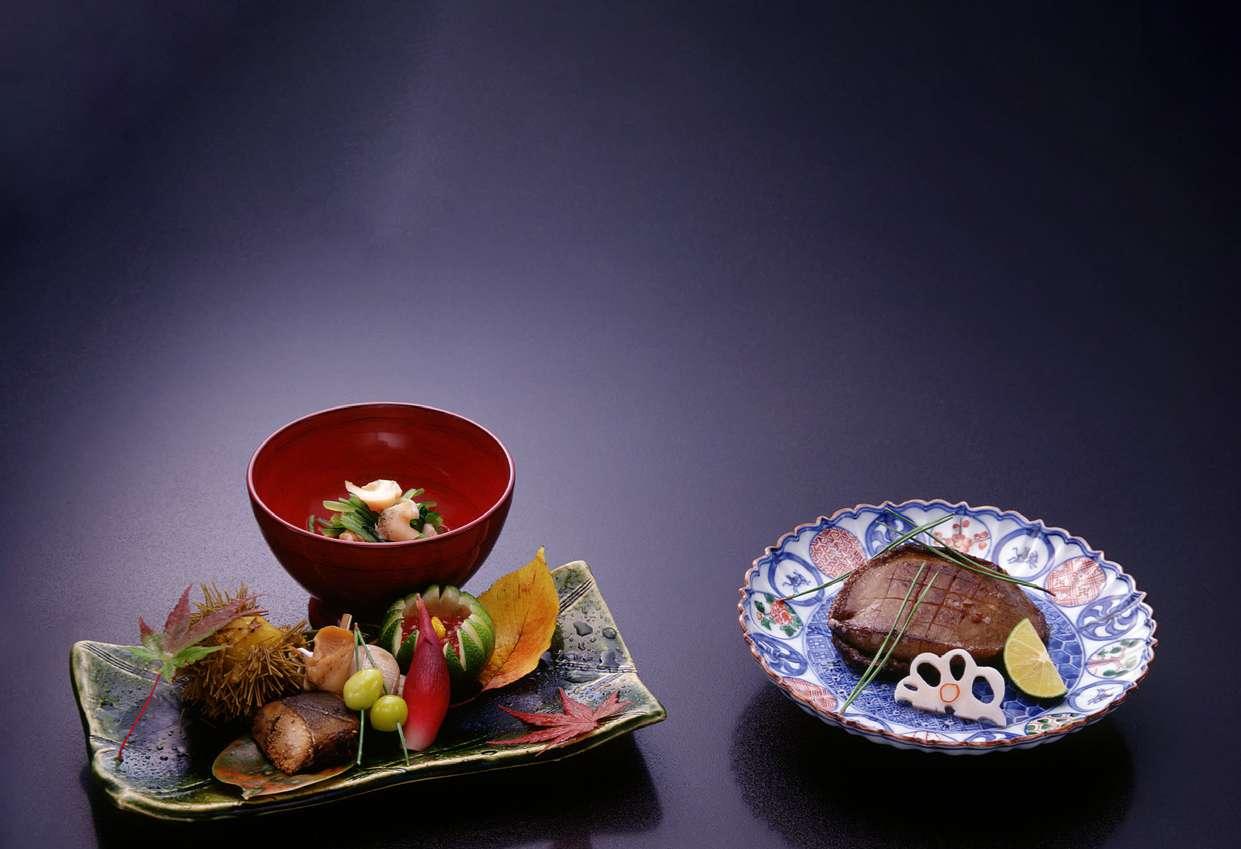
14 minute read
PARTNER CONTENT
CULINARY CONUNDRUM
Traditional Japanese cuisine faces radical post-pandemic change
Advertisement
By Michiyo Nakamoto

Hanasato, a high-end Japanese restaurant housed in a sprawling mansion surrounded by lush gardens, has been serving traditional multicourse kaiseki cuisine in the suburbs of Yokohama for decades. But on July 19, Hanasato welcomed diners for the last time, ending its 40-year history as a purveyor of traditional Japanese fine dining.
Hanasato’s decision to close its doors follows in the footsteps of Tokyo Mimiu, a Japanese restaurant famous for its udon sukiyaki, which closed its six restaurants in the Japanese capital in May. Zuboraya, a restaurant which has been serving fugu in Osaka since 1920, will also shutter its two stores in September.
The three restaurants are among the earliest and most highprofile business victims of the coronavirus pandemic in Japan. But they are likely only the first of many. “I think there will be more closures from now on,” said Kotaro Kashiwabara, chair of the Japan Gastronomy Association. “Everyone is saying that many restaurants that manage to survive through July won’t make it after August” because of the slow recovery in business, he added.
Japan has fared relatively well amid the spread of Covid-19, with the number of infections and deaths relatively low— 63,164 and 1,201, respectively, as of August 25—compared
PHOTO: ZENIYA
with regions such as the United States and Europe. Restrictions on social and commercial activities have also been looser than in many parts of the world.
IRREPARABLE DAMAGE? Nevertheless, nearly three months after the Japanese government lifted a state of national emergency at the end of May, restaurants continue to suffer from a sharp drop in business amid a mood of jishuku, or self-restraint, that has settled over the country.
Restaurant sales dropped 32.2 percent in May, following a 39.6-percent decline in April, according to the Japan Foodservice Association. In particular, high-end restaurants saw a 71.5-percent drop in sales in May. “Survival will be extremely difficult,” said Makoto Oshima, owner of Ukiyo, a ryotei, or high-end Japanese restaurant that also provides entertainment, in Niigata Prefecture.
While the impact of jishuku is being felt across the board in the hospitality sector, there is concern that the damage wrought by Covid-19 could result in irreparable harm to restaurants serving Japanese cuisine, and even threaten the future of Japan’s culinary culture.
Depending on how the industry responds to this crisis, “we could lose what should be a very important national heritage,” said Shinichiro Takagi, chef-proprietor of Zeniya, a high-end Japanese restaurant in Kanazawa.
Even before Covid-19 landed on Japan’s shores, Japanese restaurants were hurting from a steady decline in customers. A survey conducted in 2018 by the Ministry of Health, Labour and Welfare found that only 46 percent of respondents had visited
PHOTO: ZENIYA

The entrance to Zeniya, in Kanazawa
a restaurant serving Japanese cuisine in the previous three years, even though the definition of “Japanese restaurant” included casual eateries serving curry rice and other comfort foods.
FADING INTEREST The survey results point to a disturbing trend: While the rest of the world has come to enjoy Japanese cooking, the Japanese are increasingly shifting away from their traditional cuisine.
Prominent chefs and others have been raising the alarm since 2013, when washoku, or traditional Japanese cooking, was registered by UNESCO as part of the world’s intangible cultural heritage. The listing means washoku “is close to an endangered species,” Yoshihiro Murata, chef-proprietor of Kikunoi, a prominent Japanese restaurant in Kyoto, said at the time.
With Japanese households choosing to eat bread more often than rice, restaurants have been left with a bigger role in passing on the traditions and culture of Japanese cooking. But traditional restaurants—in particular those which rely on enkai, or large group dinners featuring traditional performances—have suffered a relentless decline in business due to changing lifestyles and cultural norms.
“Even before [the coronavirus], I felt very strongly that we would have to change our way of doing business,” said Oshima, who is also secretary-general of Hyakunen Ryotei Network, a group comprising 26 ryotei with a history of more than 100 years.
Corporate hospitality has declined after a prolonged economic slowdown and social changes, with young people increasingly viewing enkai with their bosses to be an encroachment on their personal time.
DYING CULTURE? The health risks posed by large gatherings and the need for social distancing in the age of Covid-19 threaten to further undermine the ability of Japanese restaurants to act as preservers of Japan’s culinary culture by forcing them to scale back their operations, if not close their doors.
Tsujitome, a fine-dining Japanese restaurant in Tokyo’s Akasaka neighborhood that has two Michelin stars, reopened in June, but its main business of providing kaiseki cuisine for large tea ceremony gatherings has not returned. Although Tsujitome enjoyed strong demand for take-home meals offered during the lockdown, this hardly made up for lost restaurant and tea ceremony sales, said Ikuko Tsuji, a daughter of the current owner.
Takagi and others believe that ryotei and other large Japanese restaurants, which are already under pressure from changing lifestyles, will be the biggest victims of the coronavirus outbreak. If that happens, Japan will lose a crucial platform for passing on the skills and traditions of its culinary heritage, they warn.
To train young chefs, “what is needed is not money or anything else, it is jobs,” said Takagi. Adding to the concern is a decline in culinary students who want to learn Japanese cooking. The most popular course in culinary schools is pastry making, followed by Italian cooking, said Kashiwabara.
The potential loss of skills is not just limited to cooking. Japanese restaurants support a broad base of sake brewers, local artisans, performers, and other service providers who rely on their customers. But the sharp drop in business means that restaurants will not be able to buy as much from their favorite ceramicists, or hire workmen to spruce up fading paper screens. If customers do not return, geishas will be out of work and will not be going to their hairdressers or buying new kimonos.
Whether it is traditional cooking, Japanese dance, crafts, or carpentry, “once traditional skills are lost, it is very difficult to revive them,” Takagi said.
It is not just traditional Japanese restaurants that are being forced to rethink their future strategy. The pandemic has deprived even sought-after Japanese restaurants serving innovative and internationally acclaimed cuisine of their main source of growth in recent years: foreign tourists.
“Japan’s restaurant industry has thrived in the past 10 years, and there is only one reason for that—inbound tourism,” said Takagi. With the persistent decline in Japan’s population, tourists are also the main hope for the future of many restaurants.
In the post-coronavirus age, restaurants that had catered mainly to foreign tourists and raised their prices sharply will now have to adjust their business models and price points to appeal to local diners as well, Takagi believes.
“We have to think not just about how to deal with the situation right in front of us, but where we should head in the medium to long term,” he added. “It seems that we are suddenly being forced to do this as a result of the coronavirus.” n
The Takagi brothers prepare sashimi at Zeniya.

PHOTO: ZENIYA
©2020 Nikkei Inc. Nikkei Asian Review is published by Nikkei Inc. All rights reserved.
STAYCATION

Special offers make summer a treat, near home
After months of staying home and limiting how much we move around the city, the siren call of beautiful, sunny days is stirring the desire for a vacation—preferably afar. With the coronavirus risk still high, it’s best to stay in the city this season, but that doesn’t mean there aren’t relaxing and intriguing getaways on the menu.
Tokyo is overflowing with a bounty of world-class hotels featuring top-ranked restaurants, breathtaking interiors, and exciting activities. It’s a reason why inbound tourism was steadily rising for a decade prior to the pandemic.
VISIT THESE ACCJ MEMBER HOTELS
n ANA InterContinental Tokyo anaintercontinental-tokyo.jp/en/
n Andaz Tokyo Toranomon Hills andaztokyo.com
n The Capitol Hotel Tokyu tokyuhotelsjapan.com/global/capitol-h/
n Conrad Tokyo conradtokyo.co.jp
n The Tokyo EDITION, Toranomon marriott.com/hotels/travel/tyoet-thetokyo-edition-toranomon
n Grand Hyatt Tokyo hyatt.com/en-US/hotel/japan/grand-hyatt-tokyo/tyogh
n Hyatt Regency Kyoto hyatt.com/en-US/hotel/japan/hyatt-regency-kyoto/
n Hilton Tokyo hilton.com/en/hotels/tyohitw-hilton-tokyo/
n Hilton Tokyo Odaiba hilton.com/en/hotels/tyotohi-hilton-tokyo-odaiba/
n Imperial Hotel, Tokyo imperialhotel.co.jp/e/tokyo/
With visitors away right now, what better time to explore the offerings as a local?
On the following pages you’ll find highlights of the many special offers available this summer and fall. Many hotels operated by American Chamber of Commerce in Japan (ACCJ) member companies are ready to make your getaway special, so check out their websites for exclusive packages and plans to find a staycation that will wash away the stress of disrupted life and leave you feeling refreshed and recharged for business success.
n Kimpton Shinjuku kimptonshinjuku.com
n The Okura Tokyo theokuratokyo.jp/en/
n Park Hyatt Tokyo hyatt.com/en-US/hotel/japan/park-hyatt-tokyo/
n The Peninsula Tokyo peninsula.com/en/tokyo/
n RIHGA Royal Hotel Tokyo rihga.com/tokyo
n The Ritz-Carlton, Osaka ritzcarlton.com/en/hotels/japan/osaka
n Shangri-La Hotel, Tokyo shangri-la.com/jp/tokyo/shangrila/
n The Strings by InterContinental Tokyo ihg.com/intercontinental/hotels/us/en/tokyo/tyose/ hoteldetail
n Swissôtel Nankai Osaka swissotel.com/hotels/nankai-osaka/
n The Westin Tokyo marriott.com/hotels/travel/tyowi-the-westin-tokyo/

THE PRINCE PARK TOWER TOKYO Until the end of autumn, Andaz Tokyo Toranomon Hills invites guests to rest and relax with three unique day-use and overnight-stay packages, allowing you to revel in luxury while exploring the local neighborhood.
For a quick indulgence, the day-use plan offers a great chance to feel the Andaz experience, and comes complete with a seasonal Lemongrass Afternoon Tea from the comfort of your room. Overnight-stay plans allow guests to spend a full 24 hours in the hotel, while couples can experience a romantic night-time picnic 250 meters above the city on the rooftop terrace.
Available for a limited time, take advantage of these unique staycation opportunities as you discover a new side of Tokyo. Packages start at ¥30,000.
Details: andaztokyo.jp/restaurants/en/special/detail/25/ Tokyo may be exempt from the Japanese government’s Go To Travel campaign, but The Prince Park Tower Tokyo has some great offers to reduce the cost of your vacation.
Until the exemption is lifted, you can get a free upgrade to a room on the side facing Tokyo Tower, along with free parking for one car. The usual noon check-out time has been extended to 3pm (maximum stay of 24 hours), and you’ll find an original 300-piece hotel jigsaw puzzle with storage frame in your room!
Reservations for this plan are limited to Tokyo residents, and you will be asked to present proof of your home address upon check-in.
ANDAZ TOKYO TORANOMON HILLS


Details: princehotels.co.jp/parktower/plan/24hourchallenge_puzzle/
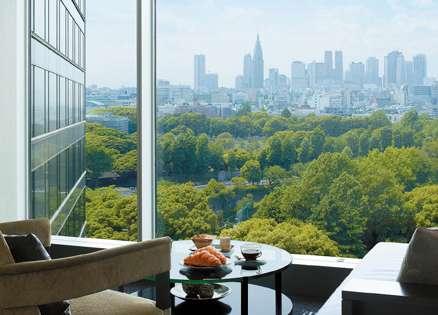
HOTEL NEW OTANI TOKYO EXECUTIVE HOUSE ZEN Executive House Zen is a five-star luxury hotel within the Hotel New Otani Tokyo complex that incorporates the concept of Zen—the true spirit of Japanese hospitality. The 10-acre onsite Japanese garden boasts a history of more than 400 years and features several ancient stone lanterns, scarlet bridges over koi ponds, a stone garden, and a waterfall, as well as a myriad of flowers and rich foliage that bloom or change colors from season to season. While nestled in the heart of this busy city, immerse yourself in the quiet and peaceful ambience that enfolds your stay.
Details: newotani.co.jp/en/tokyo/stay/exe/
PREMIERING A NEW GENERATION OF LUXURY IN SEPTEMBER 2020 Limited EDITION Staycation Offer
EDITION Hotels is an unexpected and refreshing collection of individualized, customized, one-of-a-kind hotels. Showcasing the best of dining and entertainment, services and amenities, each EDITION property is completely unique, reflecting the best of the cultural and social milieu of its location and of the time. Conceived by Ian Schrager in partnership with Marriott International, EDITION combines the personal, intimate, individualized experience that

Schrager is known for, with the global reach, operational expertise, and scale of Marriott.
Designed by Kengo Kuma, with the vision of Schrager, the Tokyo EDITION, Toranomon, embraces both the authentic history of the ancient city and the modern skyscrapers that have recently revitalized the skyline. Conveniently located near Kamiyacho, Roppongi-Itchome, and Toranomon Stations, the hotel is steps away from Tokyo’s best neighborhoods and attractions.
The Tokyo EDITION, Toranomon, boasts 206 guest rooms, including 22 suites with iconic views of the Tokyo skyline. The hotel’s design features three restaurants, including a specialty restaurant

with an outdoor terrace overlooking Tokyo Tower, farm-to-table restaurant, and lobby lounge, plus three lounge bars, a custom designed spa with six treatment rooms, state-of-the-art gym, and 387m2 of event space with four meeting studios.

Limited EDITION Staycation Offer includes:
n
n
n Daily breakfast for two guests One-time Signature EDITION Cocktail for two guests per stay ¥10,000 of hotel credit per stay (to be used in restaurants, bars, and spa only)
Contact +81 3 5422 1600 or info.tokyo@editionhotels.com to book your stay.
Subject to availability and some blackout dates apply. Not available to groups or conventions of 10 or more rooms, or in conjunction with other promotional offers. The Tokyo EDITION, Toranomon 4-1-1 Toranomon, Minato-ku, Tokyo 105-0001 WWW.EDITIONHOTELS.COM/TOKYO

PULLMAN TOKYO TAMACHI Nestled between the beautiful waterfront and historic Japanese garden, mesm Tokyo aims to inspire and mesmerize guests with its distinctive personality based on the TOKYO WAVES concept. Get mesmerized by our original fragrance when arriving at the hotel, the view of Tokyo Bay and Hamarikyu Gardens from the lobby, and even the digital piano furnished in all guest rooms.
Animate your stay with our Bistronomy-style French cuisine at Chef’s Theatre, where the sounds of cooking from the open kitchen heightens the senses as you savor the delicious creations of our culinary team.
Get mesmerized with your five senses at mesm Tokyo.
Details: mesm.jp/en/ Discover Tokyo from the waterfront! Collaborating with Tokyo Water Taxi, Pullman Tokyo Tamachi is offering several accommodation packages that let you enjoy a private cruise of Tokyo Bay for an exclusive price.
Experience the charm of the canals and waterside areas of Shibaura and Tamachi, in Minato Ward, and feel the stress of recent months fade away. It’s an especially great summer vacation for those living in Tokyo, without the need to travel outside the city!
Room and tour for two people from ¥32,400 with breakfast

MESM TOKYO, AUTOGRAPH COLLECTION
or ¥27,000 without.
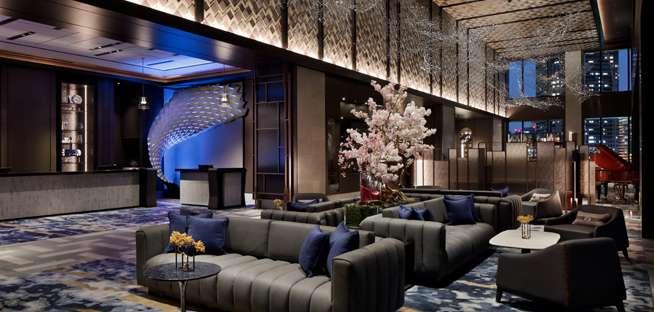

Details: pullmantokyotamachi.com
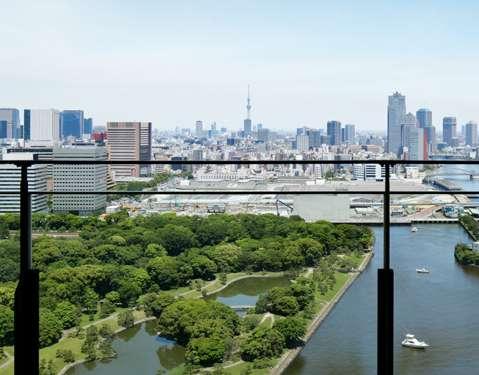
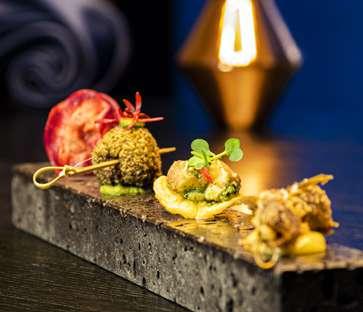
HOTEL AZABU TEN If you’re looking to carve our a little solitude, and be kind and generous to yourself during this stressful time, look no farther than hotel azabu ten’s “But first, Me” concept. Designed for the individual as a place to spend some quiet and revitalizing time alone, the compact hotel offers rooms in 10 elegant color schemes that help you feel the changing seasons and the beauty of the Japanese spirit.
But relaxing spaces aren’t the only thing on offer, as hotel azabu ten is also known for its food—including a katsu sandwich that many say is to die for. To help those looking to limit their excursions right now, they are launching a new delivery service called Totanuki al la maison. Totanuki is going above and beyond the local requirements to ensure health and safety, and that extends to their delivery and takeout menus. Of course, the quality and deliciousness of the cuisine has not changed a bit!
Totanuki al la maison delivery is available from 11:30am to 8pm. n
Details: hotel-a10.com/totanuki/en/


World-Class Specialist Care




Located in Tokyo’s Ginza district, we have been providing world-class comprehensive restorati ve and periodontal dental care to the internati onal community since 1981.






SERVICES INCLUDE: Dental emergencies • Regular checkups • Cleanings • Consultati ons • Ongoing treatment
Dr. Kohei Fujimoto is a US-trained, certified specialist in the fi eld of gum disease and implant denti stry. He is fl uent in English, and lectures in Japan and abroad.
For our patients who require additional care, we maintain a network of US-trained dental specialists for referrals in Japan, and can also coordinate with clinics overseas.
Kohei Fujimoto, D.D.S., M.S.D. Periodonti st APPOINTMENTS +81 (3) 5551-0051 or fujidc@kk.iij4u.or.jp Open weekdays 9:30 a.m.–6:00 p.m. Closed weekends and national holidays
ACCESS Ginza Station Exit A12 (Ginza, Marunouchi, and Hibiya Lines) Kami-Pulp Kaikan 4F, Ginza 3-9-11 Chuo-ku, Tokyo 104-8139 www.fujimoto-dental.com






